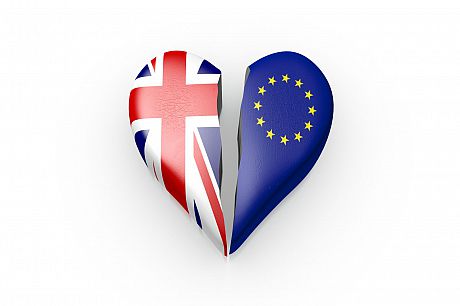Brexit: the lawyer’s first 100 days
Erika Szyszczak is Professor of Law in the School of Law, Politics and Sociology at the University of Sussex, and a member of the University's UK Trade Policy Observatory.
The “first 100 days” has become a standard by which to evaluate important political times. Undoubtedly, the momentous decision on 23 June 2016 to break up the current geopolitical space of Europe will be examined by historians as a decisive period of modern European history.
From a lawyer’s perspective the most striking feature of the last 100 days has been the legal uncertainty of how to implement the referendum result. This represents the challenge we love. So this blog examines some of these uncertainties.
Dreams of a quick divorce
 Photo © istock.com/Gutzemberg
Photo © istock.com/Gutzemberg
Dreams of a fast divorce from the EU have been thwarted by a lack of legal consensus on who may trigger the Article 50 TEU notification to leave the EU, and as to when is the optimal time to do it. The lack of a pre-nup gives much scope to the lawyer.
PM Theresa May is determined to retain a tight rein on this legal act, considering it within the powers of the executive. But this position is being challenged in the courts. For example, in the English High Court, several applications for judicial review have been given leave to proceed and the skeleton argument in the lead judicial review action has been published.
The thrust of the legal argument is that the correct UK constitutional requirement in order to trigger Art 50 is for parliamentary scrutiny and approval, alongside consultation with the devolved administrations in Scotland, Northern Ireland and the Welsh Assembly.
The legal issues framing the decision of when to trigger to Article 50 are also contentious.
Domestically, there is the need to reconcile the future internal relationship of the UK with Northern Ireland and Eire and also with Scotland and Wales.
The UK must also reconcile its future relationship with its largest trading partner: the EU. But there are other relationships to consider that are the offspring of the relationship with the EU. For example, there are third states linked (currently and in the future) in trade agreements with the EU, and the World Trade Organisation (WTO). It is a matter of legal conjecture as to what should be in the content of the withdrawal agreement with the EU under Art 50(2), and how far this agreement will set out the future legal relationship between the UK and the EU and other trade arrangements.
Living apart
How will the UK untangle 40 years of marriage? A first step will be to examine the existing EU law that has been transposed into domestic law. The UK has always fought hard to determine the final shape of EU law, and has had little difficulty in transposing EU law into domestic law using the 'copy out' procedure. One example of is the recent transposition of procurement law into UK law.
Lawyers must find a way to give effect to EU law that the UK wishes to retain in the future.
The repeal of section 2 of the European Communities Act 1972 is at the heart of the UK withdrawal process. Sect 2 gives effect to the supremacy and direct effect of EU law, and allows for EU Directives to be implemented quickly into domestic law by means of a Statutory Instrument (SI). Thus lawyers must find a way to give effect to EU law that the UK wishes to retain in the future, especially EU law which has been transposed using the SI procedure, as well as laws necessary to ease future trade deals.
Just because we’re divorced doesn’t mean we can’t be friends
Looking to the future relationship with the EU there are a number of existing legal trade frameworks developed by the EU with non-member states which could be bought off the shelf. The most immediate choices would be to take a look at the EEA Agreement, the Deep and Comprehensive Free Trade Agreement with Ukraine, the comprehensive economic and free trade agreement with Canada or the EU-Turkey customs union.
 The EU-Turkey Customs Union is one model the UK could try to replicate.
The EU-Turkey Customs Union is one model the UK could try to replicate.
But PM Theresa May appears to want something more bespoke for the UK. High on the shopping list of UK desires is access to the Single Market without the concomitant demands of membership of the Single Market; in particular, special rules on the free movement of persons and not having to contribute to the finance of the EU. Here there is little scope for mediation: the EU has made it clear that there is no Single Market a la carte.
Access to the Single Market would only ease trade in a limited way. The UK would not participate in the rule-making for the Single Market and also would not be able to stop the influence of the European Court of Justice (CJEU) on the interpretation of the Single Market rules, in particular the definition of no-tariff barriers to trade, the scope of mutual recognition and the host of legislative lacunae filled by the CJEU in its day-to-day work.
The legal limits on finding future trading partners
The indications are that the UK seeks future trading partners in a similar bespoke fashion, spurning the tendency for large multi-party deals.
Dr Liam Fox, the international trade secretary, has indicated to the press that exploratory talks with non-EU states such as India have already taken place.
 Dr Liam Fox, International Trade Secretary, has said he is already in talks with India over a trade deal.
Dr Liam Fox, International Trade Secretary, has said he is already in talks with India over a trade deal.
Photo © Chatham House.
This is tricky from a legal perspective.
The UK is tied to the rules of membership of the EU; it cannot negotiate any new deals until after Brexit has occurred. EU trade policy is within the exclusive competence of the EU. Even in policy areas where the EU has shared competence with the member states, the UK would still be limited in its actions by Article 4(3) TEU, the duty of fidelity. So, for example, the UK may not depart from a position agreed by the EU in international negotiations. Even where mixed agreements are found the European Commission takes the lead negotiating position for the EU and the member states.
There are press reports that legal advice given to Dr Liam Fox suggests that “there is a high risk” of the European Commission starting infraction proceedings against the UK if such talks went ahead, with the UK being landed with a “big fine”.
This is sensationalist reporting. Any infringement proceedings brought by the European Commission under Article 258 TFEU are not automatically brought before the CJEU. There is a long period of negotiation. Only when talks break down will the European Commission go to court. This takes several years. If the CJEU finds a member state in violation of EU law, a member state is under a duty to comply with the judgment of the Court. It is only when a member state does not comply that financial sanctions come into play under Article 260 (2) and (3) TFEU. Fines do not automatically flow from a breach of EU law: the European Commission must bring a second action against the member state.
Brexit means Brexit: but what does it mean?
Law and lawyers will have a central role to play in easing the UK divorce from the EU and drawing up the divorce settlement. PM Theresa May has not acted hastily or given away details on what the UK negotiating stance will be, or when it will start with earnest. But she cannot delay for long. The next 100 days will bring more certainty to many of the legal issues churned up in the aftermath of 23 June 2016.
Friday 30 September 2016
Disclaimer:
The opinions expressed in this blog are those of the author alone and do not represent the opinions of the University of Sussex or UK Trade Policy Observatory.
Mailing list
Sign up to receive updates on UKTPO activity.




